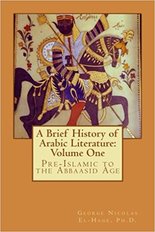A Brief History of Arabic Literature: Volume One: Pre-Islamic to the Abbaasid Age
During the Middle Ages, the Arabs ruled the civilized world. They succeeded in conquering Arabia, Egypt, Iraq, Mesopotamia and Africa, parts of China, Spain, Sicily, Portugal, Turkey, Persia, Syria, Jordan and Lebanon. Had they not been stopped by Charles Martel at the famous and decisive battle of Tours-Poitiers in 732 A.D., the Arab conquest of the West would have spread into France and beyond and, consequently, would have changed the face of Europe and perhaps even shaped the modern world altogether. This book, in two carefully selected volumes, is intended to be a short history of Arabic literature. It provides the teacher with a quick summary and gives the beginning student a broad overview in chronological sequence of the historical and literary accomplishments of the Arab people from pre-Islamic times up to the Modern Era. Volume One covers the period from pre-Islamic Arabia to the end of the ‘Abbaasid Era. Volume Two covers the period from the Arabs’ occupation of Spain to the Modern Era. Of course, there already exist many excellent books that deal with this subject matter; however, the uniqueness and usefulness of this book (which is also presented to the curious and casual reader of Middle Eastern literature, especially if he is able to also read Arabic) lies in the fact that it not only provides interesting and didactic reading material, but it also has the following features that other similar books do not have: 1. The scope and timeline are so broad and comprehensive and spans the period from 500 A.D. – 1984 A.D., all between the covers of one book in two volumes. 2. The generous number of samples of poetry and prose selections from every poet or author mentioned in this book is included here in these two volumes in the original Arabic to illustrate the text and support the discussion on every poet and writer. Hence, the student of Arabic does not have to go searching for poetry or prose examples in order to understand or support an argument. In this way, he can immediately learn to appreciate a particular poet’s poetry or writing.
During the Middle Ages, the Arabs ruled the civilized world. They succeeded in conquering Arabia, Egypt, Iraq, Mesopotamia and Africa, parts of China, Spain, Sicily, Portugal, Turkey, Persia, Syria, Jordan and Lebanon. Had they not been stopped by Charles Martel at the famous and decisive battle of Tours-Poitiers in 732 A.D., the Arab conquest of the West would have spread into France and beyond and, consequently, would have changed the face of Europe and perhaps even shaped the modern world altogether. This book, in two carefully selected volumes, is intended to be a short history of Arabic literature. It provides the teacher with a quick summary and gives the beginning student a broad overview in chronological sequence of the historical and literary accomplishments of the Arab people from pre-Islamic times up to the Modern Era. Volume One covers the period from pre-Islamic Arabia to the end of the ‘Abbaasid Era. Volume Two covers the period from the Arabs’ occupation of Spain to the Modern Era. Of course, there already exist many excellent books that deal with this subject matter; however, the uniqueness and usefulness of this book (which is also presented to the curious and casual reader of Middle Eastern literature, especially if he is able to also read Arabic) lies in the fact that it not only provides interesting and didactic reading material, but it also has the following features that other similar books do not have: 1. The scope and timeline are so broad and comprehensive and spans the period from 500 A.D. – 1984 A.D., all between the covers of one book in two volumes. 2. The generous number of samples of poetry and prose selections from every poet or author mentioned in this book is included here in these two volumes in the original Arabic to illustrate the text and support the discussion on every poet and writer. Hence, the student of Arabic does not have to go searching for poetry or prose examples in order to understand or support an argument. In this way, he can immediately learn to appreciate a particular poet’s poetry or writing.

